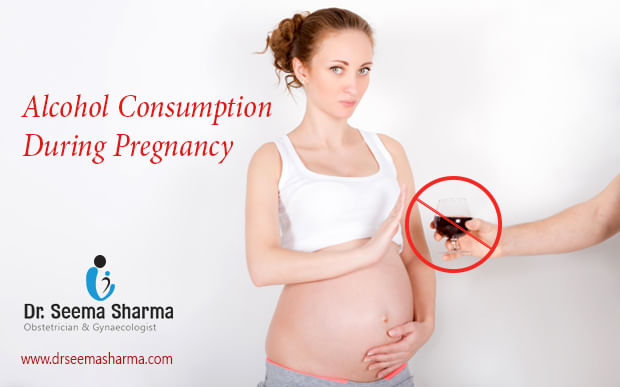Alcohol Consumption During Pregnancy
Alcohol Consumption During Pregnancy
In today's world, it is fairly common for women to drink alcohol at various social get togethers. Women are keen to know the effects of social drinking on their pregnancy and have a lot of queries regarding the same during and after the pregnancy is over.
How do we measure alcoholic drinks?
Alcohol is traditionally measured in units.One unit of alcohol is defined as 10 ml of pure ethanol in UK, and as 10 grams (12.7 ml) in Australia.One unit is the amount of alcohol the average adult can process within an hour. This means that if the average adult drinks a drink with one unit of alcohol in it, within an hour there should in theory be no alcohol left in their bloodstream, but that length of time could differ depending on a person's body size.
The alcohol content in drinks is also expressed as a percentage of the whole drink. If you take a look at the label of a bottle of wine or a can of lager you will see either a percentage, followed by the abbreviation 'ABV' which stands for alcohol by volume, or sometimes just the word 'vol'. So, wine that says '13 ABV' on its label contains 13% pure alcohol.
An average bottle of wine is about 12% strength. A bottle of whisky is about 40% strength. The higher the percentage, the more alcohol a drink has in it. A glass of whisky, therefore, is stronger than a glass of wine.
One must keep in mind that drinks poured at home tend to be larger measures than those provided in pubs and restaurants.
The maximum number of units of alcohol permitted for a non-pregnant woman is
14 units per week.
- Light drinking is defined as under 2 units a day.
- Heavy drinking is defined as over 6 units a day.
Binge drinking is having more than 5 units on any single occasions. This may make you drunk faster and more prone to unprotected sex, infections and accidents. Hence binge drinking is considered more harmful.
How does alcohol affect pregnancy?
The alcohol gets absorbed from a woman's stomach into her blood and then passes into the baby's blood through the placenta and umbilical cord. When a woman is drinking regularly during her pregnancy, it can disrupt the baby's normal development in the uterus.
Drinking alcohol during pregnancy can affect not only the way the baby develops in the uterus but also her health at birth and the baby's susceptibility to illness in infancy, childhood, adolescence and adult life. Some children born to heavily alcoholic mothers may experience learning difficulties in their adult life.
The effects of drinking alcohol are most harmful for the baby when a woman drinks just before and during early pregnancy. When she cuts down or stops drinking at any point during pregnancy, it can make a positive difference to the baby's growth. However, sometimes once the damage has been done, it cannot be reversed.
If you are a heavy drinker and then stop drinking immediately, you could experience side effects such as withdrawal, delirium and other difficulties. So if you want to stop drinking, you should discuss this first with your doctor, who will be able to help you to manage any side effects.
How much is safe to drink during pregnancy?
We do not have very clear understanding as to the absolute amount which is safe during pregnancy so to avoid even the minimum harm to the baby we recommend not to drink at all during pregnancy or while you are trying for a baby.
If at all you do drink, you should:
1) not drink more than a safe amount, which is defined as not more than one or two units, not more than once or twice per week .
2) avoid binge drinking and becoming drunk.
3) Try and pour your own drinks so you know exactly how much alcohol has gone into your glass.
4) preferably drink at home.
What happens if you are drinking too much during your pregnancy?
If you are drinking more than two units on more than two occasions a week, then there is an increased risk of:
- miscarriage (associated with more than 6 units of alcohol per day)
- stillbirth at any gestational age
- poor growth and development of the baby in the womb. It may even affect the baby's brain development which cannot be reversed later on.
- the baby may be born too early or too small.
- the baby being affected with a physical disability after birth or having learning difficulties.
- the baby may be more susceptible to illness later on in adult life.
After birth a baby born to a heavily alcoholic mother can have various learning difficulties, low academic achievement, behavior or, psychiatric problems and physical disabilities.
What is fetal alcohol syndrome?
It is a very uncommon syndrome and does not occur unless the woman drinks very heavily throughout pregnancy (over 6 units a day). Once the baby is born, there is no cure for fetal alcohol syndrome.A diagnosis of fetal alcohol syndrome is made only after the baby's birth.
What is fetal alcohol spectrum disorder?
Fetal alcohol spectrum disorder is a milder form of fetal alcohol syndrome and occurs when a woman drinks more than 2 units a day during her pregnancy.
Whether or not a baby is affected mildly or severely with FASD is directly linked to how much and how often a woman drinks during her pregnancy. If drinking is reduced and a woman stays within the recommended limit, some of the potentially damaging effects can be reversed. The baby will begin to grow normally in the womb.
What happens if you or your partner drink too much before you are pregnant?
If you are planning a pregnancy, it is advisable to stay within a safe limit during this time. Alcohol can adversely affect a woman and a man's ability to conceive and may lead to early miscarriage.
However one single episode of binge drinking around the time of conception is not likely to be harmful to a woman or her baby.
heavy drinking is known to be associated with a low sperm count. If your husband is drinking heavily, you may find it more difficult to conceive as a couple.
Even when you are breastfeeding you should ideally not drink at all or keep to less than two units as alcohol is excreted in breast milk and may affect the baby's development.



+1.svg)
